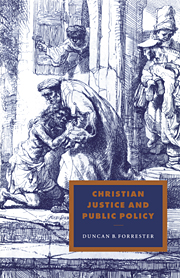Book contents
- Frontmatter
- Contents
- General editors' preface
- Preface
- Introduction
- PART I JUSTICE IN DISPUTE
- PART II POLICIES AND PRACTICES
- PART III THEORIES AND THEOLOGIES
- 5 Fairness is not enough
- 6 Justice and the market
- 7 Communication, gender and justice
- PART IV THEOLOGICAL FRAGMENTS
- Select bibliography
- Subject index
- Name index
- CAMBRIDGE STUDIES IN IDEOLOGY AND RELIGION
5 - Fairness is not enough
Published online by Cambridge University Press: 02 November 2009
- Frontmatter
- Contents
- General editors' preface
- Preface
- Introduction
- PART I JUSTICE IN DISPUTE
- PART II POLICIES AND PRACTICES
- PART III THEORIES AND THEOLOGIES
- 5 Fairness is not enough
- 6 Justice and the market
- 7 Communication, gender and justice
- PART IV THEOLOGICAL FRAGMENTS
- Select bibliography
- Subject index
- Name index
- CAMBRIDGE STUDIES IN IDEOLOGY AND RELIGION
Summary
Fairness is clearly a good thing, and a quality that is closely involved with both love and justice. A family in which the children are systematically treated in an unfair way is hardly likely to be a loving family, unless apparent or real unfairness can be justified by the demands of love. Preferential treatment for a child with special difficulties can appear to the other children to be unfair favouritism, but it should be possible to explain that the unfairness is only apparent, and is required by love. Real unfairness is incompatible with love. Similarly in a community people expect fair treatment and are aggrieved if they do not, in their opinion, receive it. Preferential treatment for women, for ethnic minorities and so on is sometimes regarded by others as unfair, and wage disputes are characteristically arguments about what is regarded as a fair wage. Although few would suggest that love is fairness, and no more, most people assume that justice is fairness, or at least regard fairness as a kind of rule of thumb for just treatment.
‘Justice as fairness’ was the slogan the American social theorist John Rawls chose to explain in simple terms the nub of his theory. The sophisticated argument in his A Theory of Justice (1972), that justice is fairness, has shown itself to be immensely influential and important. It has sparked off a major academic debate which still shows little sign of abating. When the book first appeared it immediately demonstrated that Anglo-Saxon social philosophy was not dead, as many had believed. Rawls has vigorously defended and developed his theory in dialogue with a wide range of interlocutors. Recently he has presented a refinement and elaboration of his position in Political Liberalism (1993).
- Type
- Chapter
- Information
- Christian Justice and Public Policy , pp. 113 - 139Publisher: Cambridge University PressPrint publication year: 1997



